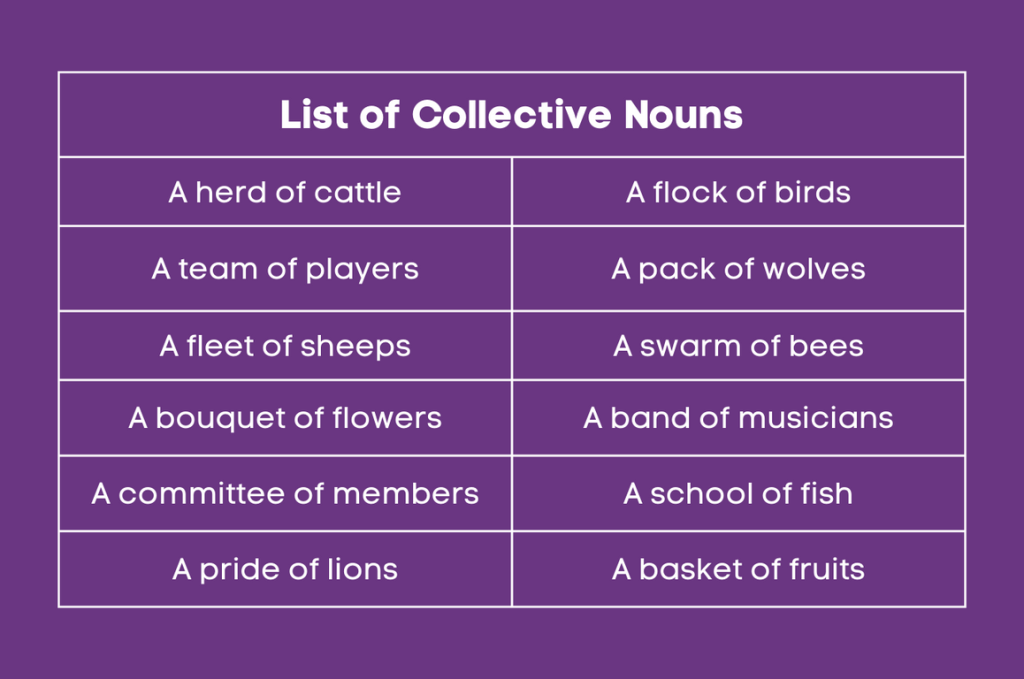Understanding Collective Nouns in English
Table of Contents
Introduction
Collective Nouns
In the English language, collective nouns are used to describe a group of people, animals, or things. They represent a single entity made up of multiple individuals. Understanding the usage of collective nouns is essential for effective communication and proper grammar.
Analogy of Definition
What are Collective Nouns?
A collective noun is a type of noun that represents a group of people, animals, or things as a single entity. It is used to simplify language and avoid repetition when referring to a collection of individuals. Collective nouns can be singular or plural, depending on the context in which they are used.
Method
Collective Noun Usage
Collective nouns are used to refer to a group of individuals as a single unit. For example, instead of saying “a group of students,” you can use the collective noun “class” to represent the entire group. It is important to note that collective nouns can be singular or plural, depending on the context of the sentence.

Examples
Examples of Collective Noun Usage
– The herd of cattle is grazing in the field. (Singular)
– The team of players are training for the upcoming match. (Plural)
– A flock of birds was flying across the sky. (Singular)
– The committee of members were discussing the new proposal. (Plural)
– The swarm of bees is building a hive in the garden. (Singular)
– The school of fish are swimming in unison. (Plural
Quiz
Tips and Tricks
1. The Animal Kingdom Quiz
Scenario: Identifying collective nouns for animals.
Tip: Learn the specific collective nouns for different groups of animals to enhance your vocabulary.
Example: A pride of lions, a herd of cattle, a pack of wolves.
2. The Nature Quiz
Scenario: Choosing collective nouns for natural elements.
Tip: Explore the collective nouns associated with nature and the environment to improve your language skills.
Example: A forest of trees, a swarm of bees, a school of fish.
3. The Music Quiz
Scenario: Selecting collective nouns for musicians and instruments.
Tip: Discover the collective nouns related to music and musical groups for better communication.
Example: A band of musicians, an orchestra of musicians, a choir of singers.
4. The Insect Quiz
Scenario: Identifying collective nouns for insects and small creatures.
Tip: Expand your knowledge of collective nouns by learning the terms used for various insects and small animals.
Example: A swarm of bees, a colony of ants, a flock of birds.
5. The Sea Quiz
Scenario: Choosing collective nouns for maritime objects and vessels.
Tip: Explore the collective nouns associated with the sea, ships, and maritime activities to enrich your language skills.
Example: A fleet of ships, a flotilla of boats, a convoy of vessels.
Real life application
Story: “The Collective Noun Adventure of Sarah and Mark”
Sarah and Mark, two adventurous siblings, embarked on a journey to explore the world of collective nouns and their real-life applications.
Adventure 1: The Animal Safari
During their visit to the wildlife sanctuary, Sarah and Mark encountered a pride of lions resting under a tree. They learned about the collective noun “pride” and its significance in describing a group of lions.
Adventure 2: The Nature Trail
As they hiked through the forest, Sarah and Mark marveled at the beauty of a forest of trees. They realized the importance of using the collective noun “forest” to represent a large group of trees in a specific area.
Adventure 3: The Music Concert
Attending a music concert, Sarah and Mark enjoyed the performance of a talented band of musicians. They appreciated the use of the collective noun “band” to describe a group of musicians playing together.
FAQ's
Like? Share it with your friends

